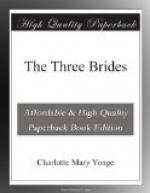As to the extinguishing Women’s Rights in child’s play, he saw that it had been a wise manoeuvre of his mother, to spare any appearance of dissension, while preventing what she disapproved and what might have injured his interests; but he was much annoyed with the De Lanceys for having clogged the measure with their own folly; and judging of cause by effect, he would hear of no excuse for Rosamond or her brothers, and went away resolved that though nothing should induce him to quarrel with Julius, yet he should tell him plainly that he must restrain his wife and her brothers from annoying Cecil by their practical jokes. He was, as usual, perfectly gentle to his mother, and thanked her for her arrangement. “It was not her fault that it had not turned out better,” he said; and he did not seem to hear her exoneration of Rosamond.
He had scarcely gone when Rosamond came in from the village, asking whether he had arrived, as she had seen his hat in the hall.
“Yes, Rosamond. You did not tell me of Cecil’s vexation!”
“Cecil? Have I seen her since? No, I remember now. But is she angry? Was it the dust-pan? Oh! Tom, Tom!”
“That and the Blockhead. Did Tom say anything very cutting?”
“Why it was an old stock charade they acted two years ago! I had better tell her so.”
“If you would it would be an immense relief, my dear. Raymond is very much annoyed; she says she will speak to nobody till she has had an apology.”
“Then she can be as great a goose as I! Why, the Yankee muse and Mrs. Duncombe took all in good part; but Cecil has not atom of fun in her. Don’t you think that was the gift the fairies left out at the christening of the all-endowed princess?”
Mrs. Poynsett laughed, but anxiously. “My dear, if you can make peace, it will be a family blessing.”
“I! I’ll eat any dirt in the world, and make Tom eat it too, rather than you should be vexed, or make discord in the house,” cried Rosamond, kissing her, and speeding away to Cecil’s door.
It was Raymond who opened it, looking perturbed and heated, but a good deal amazed at seeing his intended scapegoat coming thus boldly to present herself.
“Let me in,” she breathlessly said. “I am come to tell Cecil how sorry I am she was so much vexed; I really did not know it before.”
“I am ready to accept any proper apology that is offered me,” said Cecil, with cold dignity; “but I cannot understand your profession that you did not know I was vexed. You could have intended nothing else.”
“But, Cecil, you misunderstood—” began Rosamond.
“I never misunderstand—”
“No human creature can say that!” interposed Raymond, immensely thankful to Rosamond—whatever her offence—for her overtures, and anxious they should be accepted.
“I could not,” continued Cecil, “misunderstand the impertinent insults offered to my friends and to myself; though if Lady Rosamond is willing to acknowledge the impropriety I will overlook it.”




